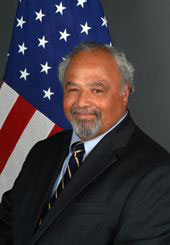PEPFAR committed to mobile health solutions - Guest Opinion by Dr. Eric Goosby
November - December, 2009 | Volume 8, Issue 6
The next phase of PEPFAR presents new challenges – how do we build on the successes of our first phase, shifting from emergency mode to a long-term solution? We will look to increasingly empower and build the capacity of local governments; train 140,000 new health care workers to strengthen the most vital part of a health system – its people on the front lines; and leverage our HIV/AIDS investments to strengthen overall health systems.
Shifting towards a long-term solution means taking advantage of the resources that are already in place, and the perfect illustration of this would be in mHealth. With over 2 million mobile phones sold in the developing world every day and substantial network coverage in Africa, there has been a paradigm shift in the communications infrastructure that we are just beginning to take advantage of. So much of what we must do is communicate – whether it's reminding a patient to take their anti-retroviral drugs, educating the public about the facts and myths of HIV infection, or simply bringing patients back for a follow-up appointment. Utilizing the mobile phone technology backbone of the continent is crucial. PEPFAR has piloted projects that:

Dr. Eric Goosby
- Encourage and track pregnant women seeking antenatal care and prevention of mother-to-child transmission services;
- Monitor orphans and vulnerable children and patients receiving home-based care; and
- Improve distribution of medicines, bed nets, and contraceptives.
PEPFAR is a partner in an existing mHealth PPP – Phones for Health with Accenture Development Partners, GSM Association, Motorola, MTN, and Voxiva. Phones for Health was initiated in 2007 and is currently operational in Kenya, Tanzania, and Rwanda, leveraging over $3 million in public and private resources annually to support HIV monitoring, Infectious Disease Surveillance and Response, blood transfusion services, and other services.
I'm thrilled that PEPFAR has signed an MOU to join the mHealth Alliance. By aligning ourselves with the U.N., Vodafone and Rockefeller Foundations and others, we hope to: First, assist in the growth of the Alliance, and thus enable scalable and sustainable mobile technology innovation and impact through leadership, global advocacy and coordination, and implementation activities; and secondly, strengthen country ownership and address PEPFAR priorities using mobile technology-enhanced solutions in emerging markets.
My office and the Alliance will work in close consultation with the PEPFAR country teams, implementing partners, host country counterparts – including Ministry of Health and Ministry of Telecommunications officials, mHealth Alliance donors, partners and affiliates in four concrete ways: One, we will share reference materials like landscape analyses, training curricula, regulatory standards, and local partnering agreement templates so that others may benefit from our existing investments.
Two, we will laser focus on Implementation and Capacity Building. We will work with the Alliance to provide PEPFAR country teams a platform and collaborative means to engage with the Alliance's stakeholder base with an eye toward strengthening our projects and services. Three, we will align our current Phones for Health PPP with the mHealth Alliance. After extracting lessons learned, we will encourage building upon the Phones for Health PPP implementation activities, where appropriate, to address PEPFAR programmatic challenges, on everything from HIV prevention messaging to health records access, health workforce support services to survey implementation and data collection.
Finally, we will create an open technology platform for mHealth programs, communications, and partnerships.
With cell phones in use in even the most difficult environments, mobile technology allows us to be more nimble, reach targeted groups more effectively, and better meet the needs of underserved or "hard to reach" populations with mobile tools and services that can truly transform healthcare – anywhere in the world.
Dr. Eric Goosby is Ambassador at Large and Global AIDS Coordinator, overseeing implementation of the U.S. President's Emergency Plan for AIDS Relief (PEPFAR), as well as U.S. government engagement in the Global Fund to Fight AIDS, Tuberculosis and Malaria. He delivered an expanded version of these remarks at the recent mHealth Summit.
To view Adobe PDF files,
download current, free accessible plug-ins from Adobe's website.